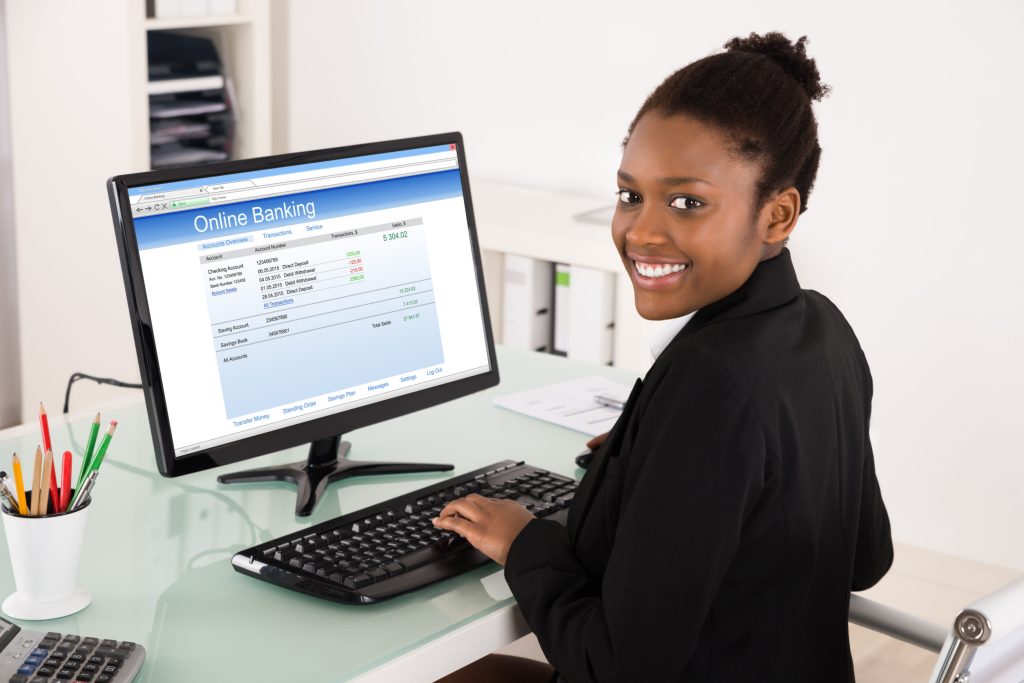Are you worried about using online banking in your business? Not sure if it’s safe? Like you, we had concerns. We hesitated in using online banking tools, even though they’ve improved considerably over the years and are available across Ghana.
Instead, we persisted with “traditional banking”. And by that, we mean:
- Writing and receiving cheques.
- Making payments in cash.
- Issuing transfer instructions letter.
- Periodically getting bank statement by email or post.
But as the volume of business increased, so too did the cost of transactions. This prompted us to assess the transaction cost of traditional versus online banking. Here’s what we discovered:
What are the transaction costs of traditional banking?
There’s more to traditional banking than meets the eye. The cash outlay and non-cash costs, such as time and resource, can be significant, include:
- Transport cost to cash and deposit cheques at the bank.
- Cost of securing cheque books and cash.
- Time and resource used to write and authorize cheques.
- Resources spent in distributing cheques or making cash payment.
- Checking balances and obtaining bank statement.
How Can Online Banking Help?
By “online banking” we mean being able to access your banking information and make payments using a computer or a smart device connected to the internet. Online banking allows you to sidestep traditional transaction costs and non-cash costs by doing the following at your own convenience:
- Check your bank balances in real-time.
- Print or export bank statements.
- Pay your suppliers/employees and send them proof of payment.
- Transfer money between bank accounts.
How has online banking helped at SCG?
Before we moved to an online banking platform, to get a clear picture of our bank balances, we often had to call or make trips to the bank.
We spent too much time processing, approving and distributing cheques, and often experienced delays in acting on transfer requests.
By switching to online banking, we quickly experienced the following benefits:
- We now initiate and approve payments and transfers from the comfort of our office. We’ve cut out the time and effort used in processing cheques.
- We have access to our bank accounts information anytime and from anywhere. We can now reconcile the accounts daily, and monitor and manage our cash flows reliably.
- We save on bank charges on statement requests and the cost of transport to the bank.
- We close our books and issue monthly financial reports shortly after month end, meaning we’re working from a more accurate and up-to-date financial picture.
In short, our transaction costs have gone down considerably, while our accounts are updated daily. Our decision-making has also improved dramatically, with current financial information at our fingertips at a moment’s notice.
Our Online Banking Security Tips
Some people believe that traditional banking is safe, and online banking is not. That’s a myth. Traditional banking and online banking are both exposed to risk. To reduce risk, you must apply appropriate controls.
Banks use high security measures to protect their data and information online. And you too must take steps to secure your accounts from internal and external fraudsters.
Here are some of the security actions we recommend, based on our own experience of implementing online banking:
- Use strong passwords. A strong password consists of at least six characters (and the more characters, the stronger the password) that are a combination of letters, numbers and symbols (@, #, $, %, etc.).
- Don’t share your password with anyone. Change your password regularly. Use the two-step authentication or tokens provided by your bank.
- Avoid using public wi-fi in accessing your online banking.
- Set up bank alerts. SMS or email notifications can alert you to suspicious activity on your account.
- Monitor your accounts regularly. Follow up with the bank on any questionable transactions.
- Secure your computers, phones and other smart gadgets with antivirus. Make sure you update your antivirus regularly.
- Exert approval controls. Businesses must always separate the person who sets up the payment from those who authorize the release of the payment instruction to the bank.
- Introduce dual controls. Ensure that one person alone cannot make changes to payment details held on the online banking system. Changes to payment details must be authorized by another person.
Online banking can reduce your transaction cost, saving you time and money. And if you implement the appropriate controls, online banking is safe, and the benefits far outweigh the risks.
Written by Mercy Badu
Mercy is the Finance Manager of SCG Chartered Accountants.
Contact us today to speak with one of our team of experts.

